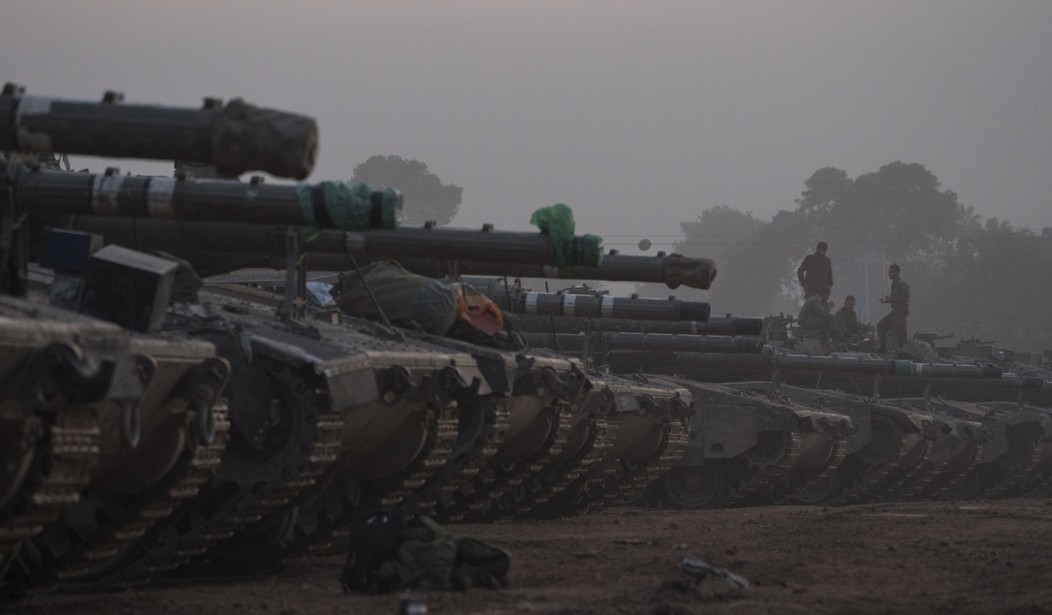Editor's note: This piece was co-authored by Natalie Ecanow.
This year, the month-long Muslim holiday of Ramadan could bring a measure of calm to the Middle East, rather than escalating tensions as it has in the past. But it will be the calm before a necessary storm, since Israel can only achieve its goal of neutralizing Hamas by dismantling the terror group’s final stronghold in Rafah at the southern edge of the Gaza Strip.
“Ramadan is coming up,” Joe Biden said last week, “and there’s been an agreement by the Israelis that they would not engage in activities during Ramadan, as well, in order to give us time to get all the hostages out.” In other words, Israel is likely prepared to offer a month-long ceasefire in exchange for the freedom of the 134 hostages that remain in Hamas captivity — an outcome that Washington is eager to bring about.
Should a hostage deal be finalized within the next few days, the resulting ceasefire will extend through Ramadan, which begin on March 10 or 11, depending on the birth of the new moon. But a quiet Ramadan will not signal an end to the war. Rather, it would give Israel a window within which to finalize evacuation plans for roughly 1.4 million Palestinians sheltering in Rafah, sparing them, to the extent possible, from the danger of the coming battle.
For Israel, sweeping Rafah is not an if but a when.
Israel must enter Rafah to achieve its objectives for the current war — namely, freeing the hostages, neutralizing Hamas, and creating a new political and security reality in the Gaza Strip.
Hamas has four operative battalions in Rafah, which borders the Egyptian Sinai. Israel believes that senior Hamas leaders are hiding in or beneath the city, surrounded by Israeli hostages. And the IDF expects to discover an elaborate network of smuggling tunnels running from Rafah into Egypt, which Hamas leverages to transport weapons and materiel. Shutting down this network is essential, since so long as Hamas — or any other terrorist group — can replenish its arsenal of weapons and fighters, it will continue to pose a threat to Israel. Israel cannot win the war without making it impossible for Hamas to regroup and rearm. It is therefore essential that Jerusalem engage with Cairo to deny Hamas access to new or existing tunnels.
Recommended
However, pressure is mounting on Israel to cancel or delay its plans. President Biden has said that without a “credible plan” to evacuate civilians, Washington will not support an Israeli operation in Rafah. The European Union also sounded the alarm last week when all 27 member states aside from Hungary warned that assaulting Rafah “would worsen an already catastrophic humanitarian situation.”
A pause during Ramadan, then, is doubly useful. Not only could it facilitate the release of hostages languishing in Hamas captivity, but by creating time and space to evacuate civilians, Israel could enter Rafah with stronger international backing.
And there may be a third benefit to pausing during Ramadan. A temporary ceasefire could encourage Saudi Arabia to renew normalization talks with Israel by signaling to Riyadh that Washington and Jerusalem take the plight of Palestinians seriously. Thus, a quiet Ramadan gives Israel the opportunity to transform its substantial military gains in Gaza into enduring strategic ones.
But with Ramadan still days away, it’s too soon to breathe a sigh of relief. In the past, Hamas and other extremists have exploited Ramadan, a month-long holiday marked by fasting and prayer, to foment violence in Israel. In 2021, clashes in Jerusalem during Ramadan spiraled into an 11-day war between Israel, Hamas, and other Palestinian terrorist groups. Hamas conjured the narrative of Israeli crimes against Al-Aqsa Mosque, one of the holiest sites in Islam, to mobilize the Palestinian street. “Tampering with Jerusalem will burn the heads of the occupiers,” Hamas’s now-deceased deputy chief Saleh al-Arouri charged shortly before Hamas began firing rockets into Israel.
This year, Hamas may hope to leverage Ramadan to turn its war with Israel into the multi-front confrontation it has been seeking since the fighting began. Yet so far it has failed to pull in Hizballah, set Judea and Samaria alight, or incite Israeli-Arab communities. But as Israeli Defense Minister Yoav Gallant warned this week, that all could change when Ramadan begins. “Hamas’s main goal is to take Ramadan, with an emphasis on the Temple Mount and Jerusalem, and turn it into the second phase of their plan that began on October 7,” Gallant said. “This is the main goal of Hamas [and] it is being amplified by Iran and Hezbollah.”
In years past, Israel has restricted Palestinian residents of Judea and Samaria from accessing the Al Aqsa Mosque during Ramadan. (Jewish access to the Temple Mount compound is even more restricted.) There is talk this year about tightening those restrictions by further limiting access to Al Aqsa based on age and residency. Likely, that would only inflame an already fiery landscape. On Wednesday, Ismail Haniyeh, Hamas’s political chief, urged Palestinians “to march to Al Aqsa” on the first day of Ramadan in response to any new restrictions.
Ramadan is expected to begin around March 10. How the intervening days unfold will be telling. If a pause is brokered before the holiday, Israel may come out the other end better positioned to enter Rafah, defeat Hamas, and unlock diplomatic opportunity.
Dr. Eyal Hulata is a senior international fellow at the Foundation for Defense of Democracies (FDD) and the first foreign visiting fellow at FDD headquarters. From July 2021 to January 2023, Eyal served as Israel’s national security advisor and head of Israel’s National Security Council (NSC). Eyal is a graduate of the Israel Defense Forces elite technology leadership program “Talpiot,” with a B.S. in physics from the Hebrew University in Jerusalem. He also holds a PhD in physics from Tel Aviv University and an M.A. in public administration from the Harvard Kennedy School.
Natalie Ecanow is a research analyst at FDD focusing on the Middle East. Prior to joining FDD, she worked on Middle Eastern affairs as an intern at the Hudson Institute and was a summer fellow with the Tikvah Fund. Natalie holds a B.A. in political science from Duke University and is an M.A. candidate in security studies at Georgetown University's School of Foreign Service.

























Join the conversation as a VIP Member